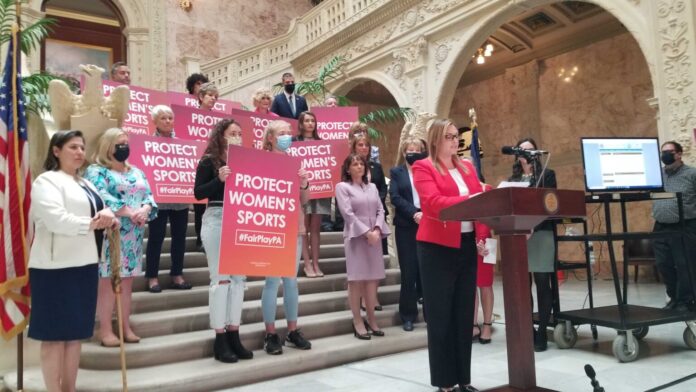by John L. Micek
An eternity ago — or was it just last week? — a quintet of Republican lawmakers in the state House trotted out a bill that would ban transgender women from participating in women’s school sports in Pennsylvania.
As the Capital-Star’s Stephen Caruso reported, the bill, euphemistically titled the “Protect Women’s Sports Act,” has little chance of becoming law, or surviving a court challenge. As an added bonus, since transgender women are women, and there’s no evidence that transgender women outperform cisgendered women, it’s also science defying.
All of which is proven not to be an impediment to this terrible idea spreading like a pernicious legislative weed across the country.
A conservative Christian group, Alliance Defending Freedom, has pushed similar legislation in 30 states restricting transgender student athletes.
Their bill is modeled on an Idaho law according to the Idaho Capital Sun, a sibling site of the Capital-Star.
A bit of background: the Alliance Defending Freedom is an Arizona-based 501(c)(3) nonprofit that focuses on advocacy, training and funding legal cases. According to its website, it focuses on the issues of “religious freedom, sanctity of life and marriage and family,” the Capital-Sun’s Clark Corbin reported on April 2.
The Southern Poverty Law Center has classified the organization as an anti-LGBTQ hate group, a designation, you will be shocked to learn, that the ADF, as it’s known, disputes. A spokesman for the group called the designation a fund-raising tactic by the Southern Poverty Law Center.
“We are very disappointed in SPLC’s attack against organizations like Alliance Defending Freedom that are standing up for female athletes, standing up for religious freedom and standing up for free speech,” Matt Sharp, the ADF‘s senior counsel, told the Capital-Sun.
As the Southern Poverty Law Center notes, the ADF has seen its clout grow nationally since the 2016 election, “[becoming] one of the most influential groups informing the [former Trump] administration’s attack on LGBTQ rights,” SPLC officials wrote of the group.
The vehicle that’s being used to spread this bill from state to state, like anti-LGBTQ kudzu, is one of the oldest legislative tricks in the books: Model legislation. It’s what it sounds like, a generic template that’s filled in, like Mad Libs, to suit the conditions in different states. And it’s by no means unique to the political right. Progressives also have embraced model bills.
As Corbin reports, it can be tough for the public to tell if bills before their state General Assemblies originated via model legislation or if they came about more organically. One tool political scientists have been using is anti-plagiarism software that will flag matches in different bills across different states. And it’s getting easier with advances in technology, Jaclyn Kettler, an assistant professor of political science at Boise State University, told Corbin.
“Model legislation isn’t anything new, there have been groups or organizations providing model legislation for a long time,” Kettler said. “ALEC [the American Legislative Exchange Council, a conservative organization] has gotten a lot of attention from reporters and scholars in terms of how successful they have been in terms of getting model legislation introduced and passed in many state legislatures, particularly in those more conservative legislatures.”
Back in Pennsylvania, LGBTQ activists are lining up in opposition to the bill.
“As the first trans person ever elected in Pennsylvania history, I know bigotry when I see it,” Tyler Titus, a member of the Erie school board, and a transgender man, told the Pennsylvania Capital-Star’s Frank Pizzoli, adding, “Hate may be the Pennsylvania GOP’s platform, but it’s not Pennsylvania’s. We will defeat this effort because this is not who we are.”
John L. Micek is the Editor-in-Chief of the Pennsylvania Capital-Star, where this article first appeared.
